ks.234
Half way to Infinity
Which is why the old fashioned capitalism so beloved of neoliberals wants to undo the gains of the many.Unfortunately capitalism worships the tiny group
Which is why the old fashioned capitalism so beloved of neoliberals wants to undo the gains of the many.Unfortunately capitalism worships the tiny group
Unfortunately capitalism worships the tiny group
No, I'm not talking exclusively about the UK, and nor were you. You were the one talking about the USA and Germany operating a full employment strategy either side of WW2. I'm extending this reasoning to your point about a job guarantee. We know we don't have this in the UK. We know none of the UK parties propose it, so it goes without saying that we don't have it here, nor are we likely to. So who does? Anyone? Any trials?You might not be talking about the UK,
No, I'm not talking exclusively about the UK, and nor were you. You were the one talking about the USA and Germany operating a full employment strategy either side of WW2. I'm extending this reasoning to your point about a job guarantee.
We know we don't have this in the UK. We know none of the UK parties propose it, so it goes without saying that we don't have it here, nor are we likely to. So who does? Anyone? Any trials?
Maybe they don't want to work as they can make a living on ebay, YouTube , Tiktok, Onlyfans, etc
Sorry to state the damn obvious, but the reason unemployment was so low after WW2 is because the UK (as well as most other european countries) had lost a large proportion of the male population to the war. For the same reason you'll see violent crime statistics take a nose dive after the war too. There were less men in the population directly after the war. It has nothing to do with any economic or political policies.Unemployment in this sense explicitly means involuntary unemployment, and what is counted and what is not counted is as much a political decision then as now. Obviously no one is talking in absolute terms but about politics and policies whose motives are directed towards full employment, or away from it.
Not sure what a one size fit all solution is, but we had much lower unemployment after WW2
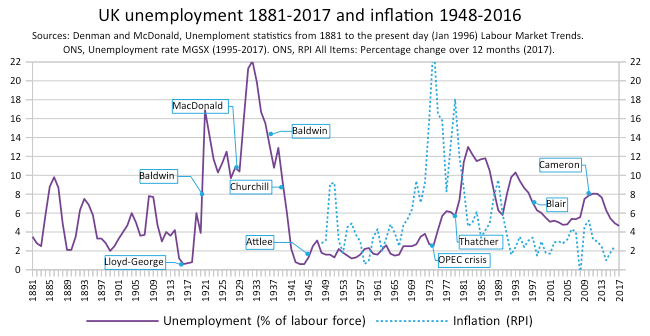
Investment in a job guarantee that provides a job for everyone who wants one on a decent wage with holiday pay and pension entitlements would go a long way to creating a more stable economy that is more capable of supporting those who cannot work due to disability and care commitments etc.
I'm not buying that. The UK (including Crown Colonies) lost 450,000 in WWII (source). That's less than 1% of the 47.5m population in 1939 (source).Sorry to state the damn obvious, but the reason unemployment was so low after WW2 is because the UK (as well as most other european countries) had lost a large proportion of the male population to the war. For the same reason you'll see violent crime statistics take a nose dive after the war too. There were less men in the population directly after the war. It has nothing to do with any economic or political policies.
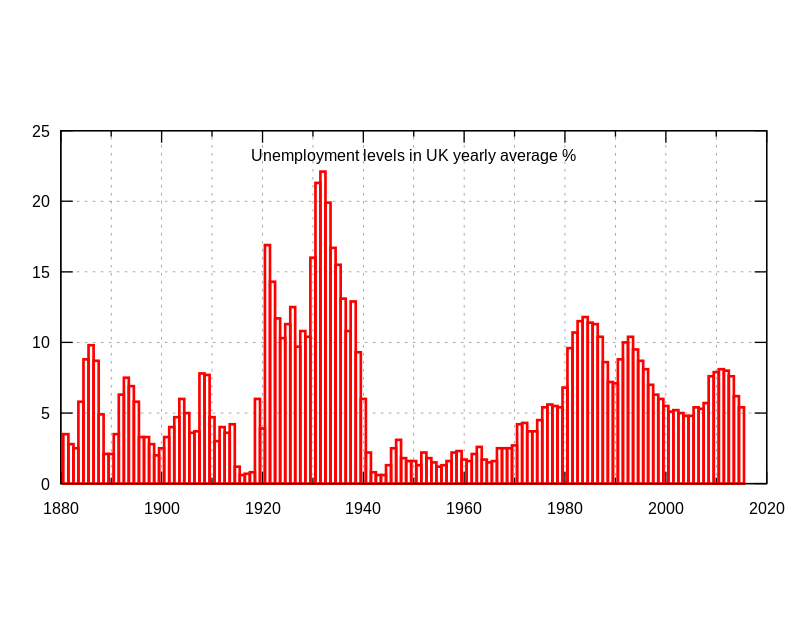
This, to imply a post war (especially a global one) period is an indication of anything that relates to nomal peace time economics is just naive in the extreme. It's akin to comparing the housing/employment situation after a large natural disaster with tens of thousands of displaced people, with a time when people have lived/worked in a safe environment all their lives.It is simply wrong to use what happened after a global war as proof of any theory of full employment - which means everyone who wants to work has a real opportunity to do so.
The obvious question is why did full employment not continue once rebuilding (in all its meanings) had been achieved?
Sure. I'm open to complexity. But your assertion thatThere is simply no comparison between the two bar the fact that they were both wars.
was simplistic in the extreme. If it were true of WWII, it should have been observable - at least to some extent - after WWI.the reason unemployment was so low after WW2 is because the UK ... had lost a large proportion of the male population to the war. [...] It has nothing to do with any economic or political policies.
Also, 'huge infrastructure damage' took place in Europe and Japan. Not in the US. So, your argument that 'rebuilding' had anything to do with historically low post-war unemployment does not seem to apply to the US. And yet, we see comparatively low post-war unemployment there, too.WWI was fought exclusively on the battlefield, it had no significant material impact on the infrastructure of any of the countries involved. WWII was an all out no limits war which impacted every aspect of life to a huge extent in the countries involved. Huge infrastucture damage took place, which needed to be rebuilt. There is simply no comparison between the two bar the fact that they were both wars.
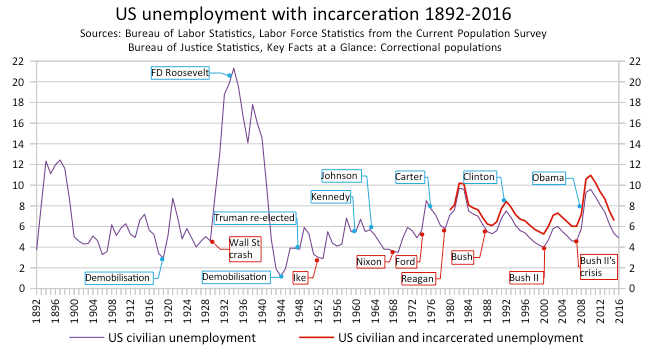
The US figures are at least twice as high as the UKs. The UK remained at 2% or lower, up until 1969, whereas the US jumped straight up to 4% and essentially stayed there or was as high as 6% over the same period. So your comparison as well as argument as to why is inaccurate.Also, 'huge infrastructure damage' took place in Europe and Japan. Not in the US. So, your argument that 'rebuilding' had anything to do with historically low post-war unemployment does not seem to apply to the US. And yet, we see comparatively low post-war unemployment there, too.
Compare 1945-1970 (averaging around 4-5%, never above 7%) with the years after (averaging around 6%, sometimes exceeding 9%).

On the face of it, this argument you are putting forward doesn't appear to be supported by the facts.
It is simply wrong to use what happened after a global war as proof of any theory of full employment - which means everyone who wants to work has a real opportunity to do so.
The obvious question is why did full employment not continue once rebuilding (in all its meanings) had been achieved?
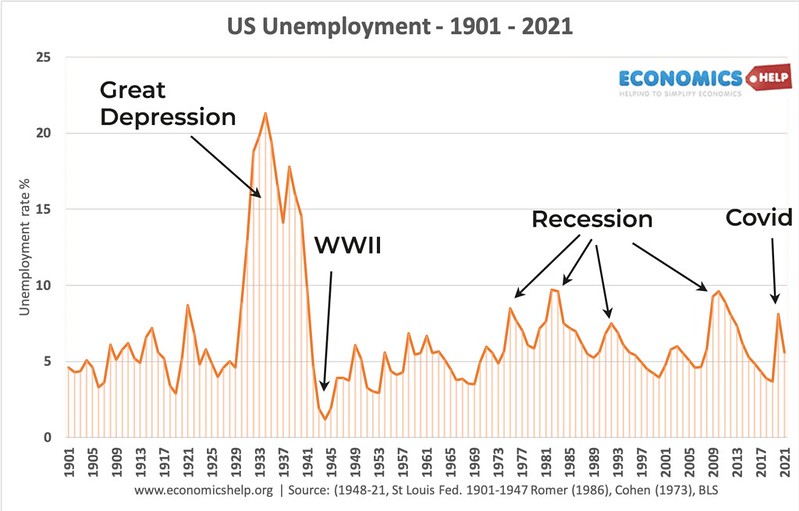
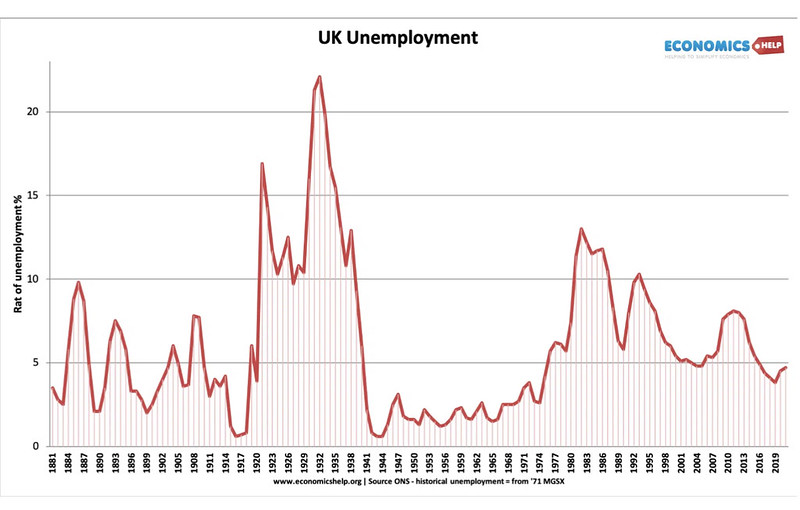
The UK unemployment figures were massaged under Thatcher by using different measures. If the same measures were applied, the unemployment figures would be 3x higher.The US figures are at least twice as high as the UKs. The UK remained at 2% or lower, up until 1969, whereas the US jumped straight up to 4% and essentially stayed there or was as high as 6% over the same period. So your comparison as well as argument as to why is inaccurate.
Depending on who's figures you believe or how it's counted 4-6% unemployment is nothing special. We had it in the UK in the mid/late 70's, from the late 90s through the early 00's and again from the late 2010's till now.

Don't know if you've watched this film, I found it shocking and shows how far power seeks to disenfranchise people of colour.The US data also seems to show the use of unemployment to drive up crime and benefit the for profit prison system
Let's recap. You argued that post-war employment was predicated on two factors: 1/ labour shortages after WW2 and 2/ 'rebuilding'. And 3/ unless I misunderstood, you argued that economic and political policies had nothing to do with post-war employment. I argued thatThe US figures are at least twice as high as the UKs. The UK remained at 2% or lower, up until 1969, whereas the US jumped straight up to 4% and essentially stayed there or was as high as 6% over the same period. So your comparison as well as argument as to why is inaccurate.
I am now 'economically inactive' and not looking for work (In previous job for just under 13-years), since becoming a stay-at-home Dad just before Christmas, the cost of full-time nursery was one of the reasons, as well as wanting to take over the childcare when the Wife went back to work full-time. Probably look at getting a part-time job down the line when the child(ren) is/are at school age.
Already ofsetting the reduced wage with far less travelling and only using one car (soon to sell the 2nd due to low use) etc.
It's been amazing to be home full-time, I actually get to be part of the development of our child rather than a hour or so after work every day, also means I can catch up with chores around the house, and crack on with gardening and other projects!
Many companies now use automated CV / resume tracking systems, and if the format of your CV is not correct you could get dropped based on that alone. https://www.indeed.com/career-advice/resumes-cover-letters/ats-resume-templateI had a very similar suspiciously fast rejection from Curry's. Applied Sun evening, received the email 11am Monday. So probably a real person rejected it, but clearly on some dumb criteria such as the "title" of my last role.
NB: It's ludicrous that recruitment teams can't see past job titles in the modern era. One could be a "Senior" position in company A and have far less responsibility or accountablity than a non "Senior" position in company B. But recruiters appear to still be stuck in the middle ages where title was everything.
